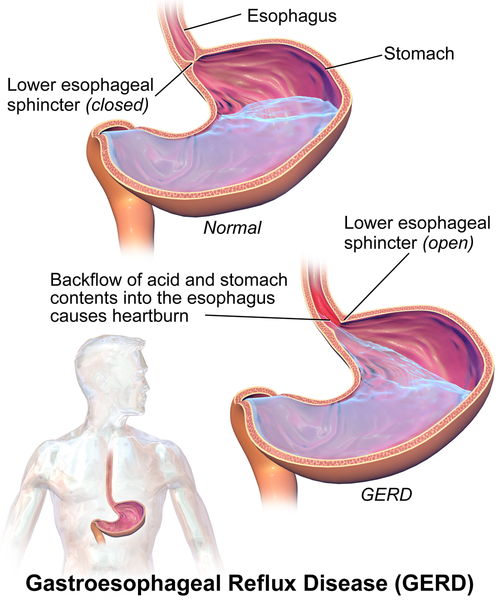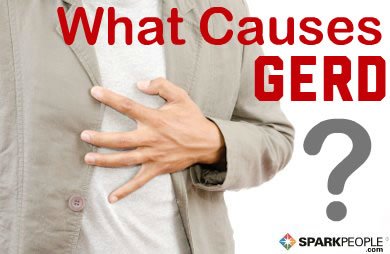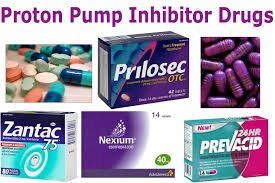Gastroesophageal Reflux Disease, BE AWARE of consequences
Gastroesophageal reflux disease (GERD) occurs when fluids and foods that normally have to get the stomach back into the esophagus. When this happens, liquids, foods, and stomach acid can irritate the throat.
Under the influence of external factors (excess of NSAIDs, food high in fat, excess coffee / soft drinks, meals too big, hot drinks and various raw food) sphincter that closes the lower end of the esophagus, at the junction with the stomach, no longer close properly. There are other factors that influence this process (hernias, trauma and other conditions, etc.). There's a tight closure to esophagus, allowing stomach acid penetration (or even gastric chyme) and climbing the esophagus. 'Thanks' to peristaltic movements acid may soar throat. Stomach acid attacks the lining of the esophagus, throat, tongue and even teeth with various unpleasant results.
Quite a few people have or will experience heartburn during their lifetime. Although uncomfortable, heartburn is not usually a serious health problem in most people. However, if heartburn are common and persistent, they can be a sign of a more serious medical problems, such as gastroesophageal reflux disease.
GERD is a chronic condition that involves stomach acid reflux into the esophagus. Untreated gastric reflux can cause a number of complications, including esophagitis, esophageal ulcers, chronic lung disease and Barrett's esophagus (a change in the lining of the esophagus that increases the risk of developing esophageal cancer).
Symptoms
The main symptom of reflux disease, namely the sensation of "burning" located behind the sternum (also called heartburn) is available in 15% of the population at least once a week, and 7% have this symptom daily. Causative mechanism is the gastric acid reflux and other components from the stomach back into the lower esophagus.
Other less common symptoms of gastroesophageal reflux disease may be:
pain in the neck
cough
hoarseness - especially in the morning
respiratory problems like asthma
bad breath.
Reporting these symptoms your doctor is required to diagnose the disease. The specialist may consider necessary to carry out special tests such as endoscopy or gastric pH monitoring to determine the seriousness of the problem and to recommend appropriate treatment.
Causes
Even if sometimes can not detect cases of gastroesophageal reflux disease, certain risk factors increase a person's likelihood of developing the condition. Just because a person are these risk factors does not mean that it will automatically suffer from gastroesophageal reflux disease.
Here are some risk factors that you should consider when it comes to gastroesophageal reflux disease:
Hiatal hernia. The esophagus passes through an opening in the diaphragm called the hiatus, which helps to close the lower esophageal sphincter. Hiatal hernia occurs when a small portion of the stomach sphincter and hiatus are pushed through the chest cavity. This can cause the sphincter weakness and it will not be able to effectively block acid reflux.
Pregnancy. Many women develop gastroesophageal reflux or gastroesophageal reflux symptoms worsen during pregnancy. Nearly half of pregnant women experience heartburn at one time and up to 25% of them suffer from heartburn daily.
Some doctors believe this is because the fetus grows and puts pressure on the stomach to the diaphragm pushing it. Such an increase in pressure on the stomach can cause the lower esophageal sphincter opening, even when not needed. Thus, acid reflux occurs. Also, normal hormonal changes that occur during pregnancy can weaken the sphincter, another factor that can trigger gastroesophageal reflux disease.
The use of tobacco products
Certain foods can increase the risk of developing gastroesophageal reflux or worsen symptoms of this condition. These include:
chocolate
Mint
fatty foods
tomato products
carbonated drinks with caffeine
alcohol
citrus and citrus juices
Use of certain medications. Some drugs may increase the risk of gastroesophageal reflux disease manifests. These drugs include certain birth control pills, tricyclic antidepressants used to treat depression, anticholinergic drugs and calcium channel blocker used to treat hypertension, chest pain or arrhythmias.
Respect the three meals of the day; 3 hours away from the last meal you can get a snack. Hydrate yourself properly.
• Do not sleep at night in less than 3 hours after the last meal. Do not lie in bed (if you can) to less than 1 hour after a meal during the day. If an episode of extremely acid - do not stretch at all.
- Overweight or obesity. If you have belly, try "get down" (through exercise and diet NOT starvation) .🙂
• Watch out for foods you've identified as triggers of a crisis. Especially stay away from coffee, alcohol, chocolate and peppery food. Try not to eat large meals 4 meals a day is better than eating 3 times, but with a 2-3 course meal.
• Chew food really well (especially meat). As a piece of food entering chewing and crumbled in the stomach, the less it stay there. As less sit there, much less acid will be secreted to digest a chemical (this is especially true for proteins, which are mostly digested in the stomach).
• Sometimes you feel just a little sore acid after a meal, chewing for a short period to a chewing gum can help. This gum in the mouth leads to secretion of saliva. Saliva has a very weak acid pH neutral or slightly basic (ranging between 6.2 and 7.4, depending on food intake or various medical conditions). Either way, it helps cleanse the esophagus and acid tongue. It dilutes. Do not overdo it though! I mean never not chew more than 10-15 minutes chewing gum. First, chewing leads to vagal nerve stimulation, leading to stimulating the secretion of acid in the stomach. So the body will create more acid, which is then possible to reach your throat. In addition, chronic chewing gum can lead to cartilage damage jaw, headache (due to chronic tensioning of some of the jaw muscles). If gum sweetened with aspartame is not good. Aspartame is a sweetener that can create problems intake over a long period. If it's sweetened with sugar is worse (for teeth).
• Beware of eating too cold or hot. Hot tea, for example, burn the lining of the esophagus. If there appears some acid, you realize that not all will be well. Peppermint tea is not good for a problem with GERD. Mint least irritate the stomach lining.
• spicy foods, chili, garlic irritate the stomach lining. Beware of them.
Treatments
There are several treatment options for people suffering from gastroesophageal reflux disease. The doctor is the one to decide which treatment is appropriate for you, depending on a number of factors such as:
Changes in diet and lifestyle; Depending on the situation of each patient, symptoms may improve just by simple changes in diet and lifestyle. Many people find that there are several elements that worsen symptoms, so it may take some time to experiment and find out exactly what needs to change in your diet or you must make changes in lifestyle to soften manifestations of the disease.
Medication; As part of the treatment for gastroesophageal reflux disease, your doctor may prescribe medications to decrease the production of stomach acid. Other drugs help lower esophageal sphincter contraction efficiency and helps better to close the area between the stomach and esophagus.
Surgery. If the combination of dietary changes or lifestyle with drug therapy is not effective, your doctor may recommend surgery. The surgery can be done with the assistance of a laparoscope, leaving behind scars less visible.
Bibliography:
Source1
Badillo, Raul (2014). "Diagnosis and treatment of gastroesophageal reflux disease". World Journal of Gastrointestinal Pharmacology and Therapeutics.
If you like my work, please consider giving me a follow. Check others posts about medicine and health on my page!
🙂🙂🙂




Thanks for posting this. I suffered from it a few years back and am cured and can drink Mountain Dew again! It was hell when I was having it.
Be careful because it can return.
OK, thanks for the advice.
I used to have a real problem with this until I lost a lot of weight but that's a long story anyway it is horrible. The ironic thing is that peppermint oil is sometimes prescribed for IBS symptoms but if you have GORD too then it can make it worse - even the gastro resistant capsules don't necessarily survive your stomach.
Where you told to lose weight by a Doctor
Yes but I also wanted to lose weight anyway.
I am glad to hear the weightloss cured the reflux
Mostly - I still get it occasionally with the wrong type of food. Would also love to be thinner. There is that last stubborn 20% or so of the weight that keeps coming back. The only way I can keep it off is by visiting the gym for a couple of hours every day but I tend to keep lapsing when life gets in the way!
How much weight did you lose
About 50Kg.
I hope you are felling well now.
The problem about the Gastroesophageal Reflux Disease is that the muscle cardia of esophagus can't be the same after you have this problem and you will have all your life take care. That's why I think we should protect and prevent that this disease will not affect us.
I agree, this problem will follow us all life.
What i suggest to the people i am doing acupuncture treatment is to stop eating after the sunset or at least they should never eat after 7 pm. Try it for a week and if you don't see any change then follow med treatment.
It's a good advice
I once suffered from reflux and thought that i was having a heart attack.
yes, the first differential diagnostic must be with heart disease.
how did you treat your GERD ?